PoliticsNow: Last Australian troops to withdraw from Afghanistan by September 11
An emotional Scott Morrison has paid tribute to the 41 Australian soldiers who have died serving in the troubled nation.

- PM’s goal for gradual border reopening
- Diggers to withdraw from Afghanistan
- Jobless rate falls to 5.6pc
- Recovery near complete for airlines
- Qld eases COVID-19 restrictions
- Women abandon Coalition in droves
Welcome to PoliticsNow, our live coverage of the latest headlines from Canberra as well as Australia’s response to the COVID-19 pandemic.
An emotional Scott Morrison has confirmed Australia’s remaining troops in Afghanistan will depart the country by September after US President Joe Biden announced an end to the almost 20-year long war.
The unemployment rate fell from 5.8 per cent to 5.6 per cent in March, as the economy added a further 70,700 jobs – the sixth consecutive monthly lift in employment.
Qantas is close to a complete recovery in its domestic flights business, while Virgin has announced it’s adding more flights, planes and jobs in the coming months.
Rhiannon Down9.55pm:TGA to investigate post-jab death
Federal health authorities are investigating after a NSW resident died just days after receiving a COVID vaccine.
NSW Health confirmed that an individual had died after they received the jab and the Therapeutic Goods Administration was investigating.

Health authorities would not confirm the person’s gender and age, though media reports claimed it was a 48-year-old woman from NSW’s Central Coast. It is also unknown which of the vaccines the person had received.
NSW Health stressed a causal link between the vaccine had not yet been established.
“NSW Health is notified when a serious or unexpected adverse event occurs,” a NSW Health spokesperson said.
“NSW Health investigates these events and refers its expert panel findings to the TGA, which is responsible for assessing causality.
“Many conditions can arise during normal life, whether or not a vaccine is administered, but it remains important to report any new serious or unexpected events so that safety can be appropriately monitored.”
The TGA released a statement late on Thursday night emphasising vaccine-related clotting is very different from common blood clots.
“The blood clotting disorders being investigated in connection with the AstraZeneca COVID-19 vaccine are very rare and differ from common blood clots or venous thromboembolism, which occur in around 50 Australians every day,” the statement read.
“The clotting disorder being investigated in connection with the AstraZeneca COVID-19 vaccine, which is now referred to as ‘thrombosis with thrombocytopenia syndrome’ (TTS), has been confirmed in only two cases out of over 700,000 people who have received the AstraZeneca vaccine in Australia.”
Jess Malcolm8pm:Frydenberg hails stimulus for pandemic recovery
Josh Frydenberg said federal government stimulus and targeted sector-specific support is to thank for Australia’s strong COVID-19 economic recovery.
Speaking to ABC’s 7.30, the Treasurer said the transition from JobSeeker to stimulus given to tourism, aviation, as well as arts and entertainment sectors have helped bolster Australia’s employment rates.

“Employment is up, workforce participation is up, the number of hours worked is up,” Mr Frydenberg said. “We’re now seeing more Australians in a job than ever before.
“We’ve seen 2000-plus jobs created every day over the month of March. Around 80 per cent of the new jobs have gone to women. And around half the jobs have gone to young people.”
Mr Frydenberg said Australia’s economic recovery from the pandemic-induced recession is four times better than the experience following the 1990s recession, and has outperformed all major advanced economies in the world in the last 12 months.
While some parts of the economy have bounced back, the Treasurer admitted CBDs are still doing it tough, with commercial occupancy rates in Sydney at 50 per cent and in Melbourne as low as 35 per cent.
“We have provided more general economic support across the economy, which will help those businesses in the CBDs, that the key to getting those businesses back on their feet is obviously the successful suppression of the virus, the easing of the restrictions,” he said.
“We also announced some other particular measures which will help those businesses, including low-cost loans and other measures.”
READ MORE:Boosting returns from services is key to riches
Jess Malcolm7.15pm:Keneally makes her own way to Christmas Island
Federal Labor MP Kristina Keneally is heading to Christmas Island tonight to visit the Biloela family that has been detained since 2019, despite claims that Defence Minister Peter Dutton cancelled her chartered flight.
Speaking to The Project from the airport where she has booked a commercial flight, Ms Keneally said she was “saddened” her committee members could not travel and called on Mr Dutton to explain his decision.
Shortly, I’ll be talking live to @theprojecttv about my trip to Christmas Island to meet the #hometobilo family .......despite @PeterDutton_MP cancelling the airplane yesterday......
— Kristina Keneally (@KKeneally) April 15, 2021
Looking forward to meeting Nades, Priya and the girls. pic.twitter.com/745nZGQnu8
“Yesterday we had public confirmation from Australian Border Force that I had been given permission to visit the Biloela family and within an hour Peter Dutton, who is no longer in charge of Border Force, but is in charge of the aeroplanes that Defence have at their disposal, cancelled the committee’s trip,” she said.
Ms Keneally said she hopes to assure the family that there are people in Australia who support their plight to return home to regional Queensland, and will investigate the conditions of the detention centre where they are being held.
“The Australian government has spent $50 million of taxpayers’ money fighting court cases and detaining this family of four with their two little girls born in Australia,” she said.
“They’ve spent most of their life in immigration detention and the minister could, with the stroke of a pen, end this sad saga today and allow this family to come home and particularly can I say allow these girls to resume their lives.”
READ MORE:‘World at risk of great polarisation’
Jess Malcolm6.54pm:Virus fragments detected in wastewater in Victoria
Unexpected coronavirus fragments have been detected in wastewater in Victorian suburbs, placing residents on high alert.
Victorian health authorities are urging people who live in or have visited affected areas to monitor for symptoms and get tested.
Coronavirus fragments have been detected in wastewater from catchments servicing:
— VicGovDH (@VicGovDH) April 15, 2021
-Cranbourne & surrounding suburbs (6-12 April)
-North, west & eastern suburban Melbourne (4-12 April)
People who've visited these areas should monitor for COVID-19 symptoms & get tested. #COVID19Vicpic.twitter.com/avLkloxCGP
Areas include Cranbourne and surrounding suburbs from April 6-12, and north, west and eastern suburban Melbourne from April 4-12.
Rosie Lewis 5.25pm: PM’s plan to reconnect Australia with world
Scott Morrison has revealed his “first goal” to reconnect Australia to the rest of the world will be allowing vaccinated Aussies to go overseas “for important purposes” – like work, medical reasons or funerals – and return via home quarantine.
Australians already abroad who had been “properly vaccinated” would be able to come back in the same way, significantly freeing up the hotel quarantine system, but it was unclear what brand of COVID-19 vaccine they would be required to have.
“The first goal I think is to enable Australians who are vaccinated to be able to move and travel, particularly for important purposes. And secondly, for Australian residents and citizens from overseas who have been properly vaccinated, they will be able to come back in that way,” Mr Morrison told a community forum in Perth.

“That would enable Australians to travel first for business and those sorts of things but ultimately if that worked well over a period of time and the data was showing that home-based quarantine was not creating any additional, scaled risks, that could lead to something more significant. That is how we move to the next step.
“That would require being vaccinated and I think that would be an important incentive to do that.”
The Prime Minister also nominated Singapore as the next country for a travel bubble and said if Australia was going to manage the coronavirus like the flu, the states could not shut domestic borders or place new restrictions on football games if community transmission returned when the international border reopened.
READ the full story here.
Matthew Denholm 4.50pm: Nobody wants to lead a Tasmanian hung parliament
Tasmania faces chaos — or a quick leadership change — in the event of a hung parliament, with both party leaders pledging not to lead a minority government.
In the first of three debates ahead of the May 1 state election, both Liberal Premier Peter Gutwein and Labor leader Rebecca White on Thursday insisted they would refuse to govern without a majority.
“Minority governments just don’t work,” Mr Gutwein told an audience of business and community sector leaders at Hobart’s Wrest Point Convention Centre. “The last minority government we had delivered a recession that cost 10,000 jobs and Tasmanians left the state in droves.
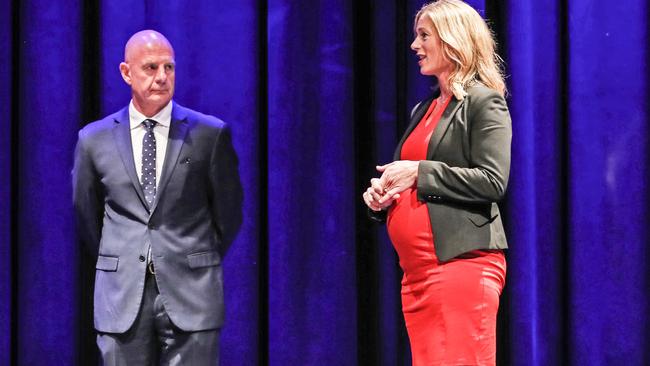
“I’ve made a decision about my future. Very clearly: if Tasmanians elect a minority government on the 1st of May, I will not lead it as Premier.”
After questioning from the moderator, Ms White made the same pledge, potentially creating a headache for Governor Kate Warner in the event that neither party wins 13 or more of the 25 House of Assembly seats.
“I wouldn’t lead a government that wasn’t in majority,” Ms White said.
During the debate, neither leader explicitly ruled-out their parties governing in minority with a different leader.
READ MORE: Report card fires up state campaign
Jade Gailberger 4.15pm: Albanese’s pledge to nervous coal workers
Anthony Albanese has again pledged that coal will continue to “play a role in powering our economy” under a federal Labor government.
The opposition leader, who is on a tour of Queensland, is yet to visit a coal mine since taking on the top job.
But on Thursday he had a message for coal workers who fear they might lose their jobs.
“Every worker in Queensland has my respect, including people in the coal industry,” Mr Albanese said.
“Coal will continue to play a role in powering our economy.
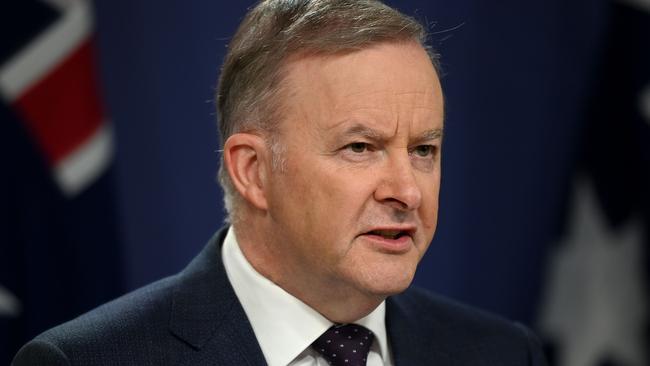
“There won’t be a new coal-fired power station built because of the changes to the markets.
“But we’ll continue to export coal … for power generation. But also, of course, for the creation of steel.”
The Labor leader made the commitment to back Australian coal exports at the end of 2019, ahead of a trip to regional Queensland.
READ the full story here.
Joe Kelly 4.00pm: Troops withdrawal ‘too many years coming’: Rudd
Kevin Rudd has declared the announcement of the withdrawal of Australian troops from Afghanistan had “been too many years coming” and argued for a period of national reflection on why the military presence had been maintained for so long.
The former Labor leader argued for Australia to continue to provide aid to the Afghan government into the future to help its economic development and extended his thanks to the men and women of the ADF who had served in the conflict, including those who perished.
“I hope that, in the aftermath of this longest war, our country will take a hard look at our experience in Afghanistan including questioning why we have maintained a lingering military presence for so long after the mission in Uruzgan concluded,” he said.
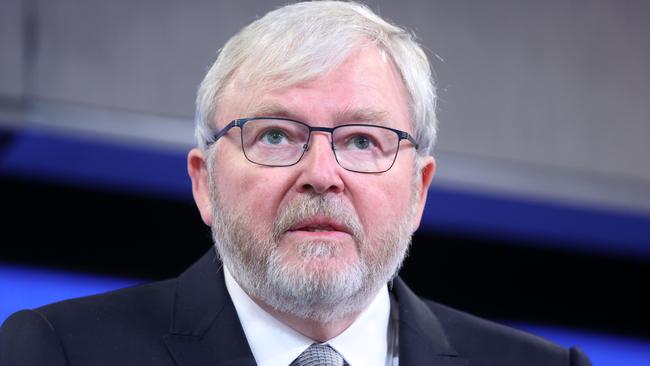
“Secondly, Australia should remain a long-term aid partner of the Afghan government. This should focus on training programs for Afghan economic officials, sustainable agriculture, basic health care and infrastructure.
“I’d like to extend my gratitude to those service members who upheld the finest traditions of the Australian Defence Force and their families, including those who did not return.”
READ MORE: Former Army chief’s Taliban warning
Jess Malcolm 3.55pm: Vaccination numbers top 1.35 million Australia-wide
A total of 1,359,305 vaccines have been administered as part of the federal government vaccination rollout, with 63,633 doses given in the last 24 hours.
The Commonwealth has administered 747,972 with 47,640 given in the past 24 hours up to Wednesday night.
The states and territories have given 611,333 with 15,993 completed in the last 24 hours.
NSW has administered the most with 164,855 followed by Victoria with 155,928, Queensland with 117,763, WA with 72,263, Tasmania with 26,728, South Australia with 42,601, ACT with 19,236, and the Northern Territory with 11,959.
A total of 589,280 have been administered in primary care clinics by the Commonwealth, and 158,692 given in aged and disability facilities.
The figures are part of the new commitment by the commonwealth to release daily numbers in a bid to increase transparency in its rollout.
RICHARD FERGUSON2.58pm: ABC apologises to Governor-General, not dancers
The ABC has apologised to Governor-General David Hurley for falsely suggesting he watched a Sydney dance troupe “twerk” at a Naval ceremony, but did not apologise to the dancers and denied claims they manipulated images to exploit them.

Sydney dancing troupe 101 Doll Squadron, who performed at a naval ship commissioning have accused the ABC of exploiting them, say they now feel threatened and unsafe.
101 Doll Squadron went viral after they performed to an audience of dignitaries, including the Chief of Defence Forces Angus Campbell, at the Sunday launch of HMAS Supply.
Mr Hurley’s office has said it was “disappointed” the ABC story depicted him in the audience, when he was not present.
“The performance occurred before the Governor-General arrived. The presentation of the video to suggest otherwise was disappointing,” the Governor-General’s spokesman said.
An ABC spokeswoman said they had run the footage of Mr Hurley and Chief of Navy Michael Noonan when it received information they were present for the dance, and then moved to correct the story when Defence denied it.
“The video should not have been edited in that way and the ABC apologises to the Governor-General and the Chief of Navy, and to viewers, for this error,” she said on Friday.
“After the Defence Department confirmed the Governor-General and Chief of Navy had arrived at the event after the performance, the reporting was amended. The report that went to air on the 7pm News bulletin on Wednesday night did not include the footage. The online story has also been updated to make this clear.”
The dancing troupe’s leader Maya Sheridan says the ABC – which ran a story in which senior government MPs attacked the move to use them at the ceremony – had used deliberately exploiting images.
But the ABC in its statement said they had not filmed the dancers in any different way to suggest the dance was more provocative than it was.
READ the full story here
Joe Kelly 2.27pm: Former Army chief’s Taliban warning as troops exit
Former chief of Army Peter Leahy has argued that “the strategy was missing” in the war in Afghanistan and warned a terror base could again grow under the Taliban and fan extremist movements in the region, including the Philippines and parts of Indonesia.
Professor Leahy said the initial decision to commit to the conflict following the 9/11 terrorist attacks to “get Osama bin Laden, to get al-Qaeda, to make sure that Afghanistan didn’t become a haven for terror operations” was correct.

“But then we lost focus. We went off to Iraq in 2003. And then we had a series of changing strategies of missions. Just look at the names of the task forces that we sent there, training, mentoring, reconstruction, support and so on,” he told Sky News.
“There really wasn’t this clear definition of a strategy, what the end state was going to be. Indeed, I’ve seen some commentators talking about the strategy being not to lose rather to win. So I think we really should be asking questions of ourselves as we perhaps look for conflicts in the future: what is our end state, what are we going there for, what is the mission, what are our interests and most importantly what does victory look like?
“I don’t think we have clear answers for them.”
READ the full story here
Richard Ferguson 2.19pm: PM blasts ABC over ‘misleading’ dancer footage
Scott Morrison has blasted the ABC’s report on the matter, saying it was “misleading” and saying he felt for the dancers who have been caught up in the story.
“I am disappointed that this event was so misreported. I think that was disrespectful to the performers,” he said on Thursday.
“To suggest the Governor-General or others were in attendance in that way, I think that was very dishonest and I think standards have failed.
“It is clear much of the reporting that we have seen of that matter – and that has been provided to Australians – in this case by the ABC was wrong, was false, and was misleading … the ABC should be reflecting on that.”
READ the full story here
Adeshola Ore 1.31pm: Remaining Aussie troops to leave Afghanistan
Scott Morrison has confirmed Australia’s remaining troops in Afghanistan will depart the country by September after US President Joe Biden announced an end to the almost 20-year long war.
The Prime Minister said Australia had been reducing its military presence in Australia over the past two years.
“In line with the United States and other allies and partners, the last remaining Australian troops will depart Afghanistan in September 2021,” he said in Perth.
“The decision represents a significant milestone in Australia’s military history.”
The Department of Defence figures show there are about 80 troops remaining in Afghanistan.

“Over the last 20 years has been a steadfast contributor to the fight against terrorism in Afghanistan,’’ Mr Morrison said. “Australia has fought alongside coalition and Afghan partners to degrade the capabilities of terrorist organisations.”
A teary-eyed Mr Morrison paid tribute to the 41 Australian soldiers who had lost their lives while serving in Afghanistan.
“Many were wounded, some physically, others mentally and we’ll be dealing with the scars, both mentally and physically, of their service for many years,” he said.
Making the announcement, Mr Morrison read out the names of the 41 soldiers on Australia’s honour roll who lost their lives “for the sake of freedom.”
“This loss is great. The sacrifice is immense, the bravery and courage are things we speak of but not know of personally. These brave Australians are amongst our greatest ever.”
Mr Morrison said today was dedicated to the memories of the 41 soldiers who lost their lives.
“We think of their families, their friends, the life they would have lived. But they gave that for others they did not know.”
“We can be so proud of them, of their service. We’re so proud of them, of their service.”
READ MORE: It’s time to end the forever war, Biden says
Olivia Caisley 1.26pm: ‘Sky hasn’t fallen in without JobKeeper’
Josh Frydenberg has defended the government’s decision to end the JobKeeper wage subsidy payment, declaring the latest job figures show that despite the tapering off of payments the “sky hasn’t fallen in” just yet.
The Treasurer on Thursday said that while some sectors of the economy were still doing it tough, it would not have been fiscally responsible to keep the payment going beyond its end on March 30.

He said the “early data” from the end of the program did not point to a massive spike in people “turning up at Centrelink” as he repeated that the wage subsidy was only ever designed to be a temporary payment.
“Certainly there were people who were relying on JobKeeper. There are certainly sectors across the economy, be they tourism, international education and aviation that continue to do it tough. My point is a broader point, which is that we held firm when people called for us to extend JobKeeper, because that was the advice from the Treasury and we couldn’t afford an emergency payment like that going indefinitely.”
“Our political opponents said the sky would fall in with the end of JobKeeper. I’m not seeing the sky falling in just yet.”
The unemployment rate fell from 5.8 per cent to 5.6 per cent in March, as the economy added a further 70,700 jobs, new figures show.
Lachlan Moffet Gray 1.20pm: Demand for preloved cars surges
Used vehicle prices continued a “relentless path higher” in the first quarter of the year as Australia’s strong economic recovery, combined with new vehicle supply constraints, pushed the cost of a preloved car 37 per cent above pre-pandemic highs.

A report by Moody’s Analytics senior economist Michael Brisson shows that the average price of a second hand car lifted five per cent in the three months to March – the slowest quarterly increase in the past year, but a rate of growth above any quarterly increase in the decade prior.
It means the cost of a 2018 Toyota Camry sold at auction in NSW has increased from around $26,000 to just under $30,000 in less than a year, according to Moody’s data.
The price of a similarly aged Ford Ranger has lifted from $32,000 to around $39,000.
Mr Brisson said growth in the prices of used cars was directly linked to economic growth lifting demand for new cars above what the market is able to supply.
“Demand for vehicles has been boosted by a strong economic recovery. The Australian economy has jumped back quickly thanks to aggressive federal fiscal policy and successful control of the COVID-19 outbreak,” he said.
“Already-tight inventories have been stretched thinner as manufacturers around the globe grapple with a bottleneck of available semiconductor chips,” he said.
READ the full story here
OLIVIA CAISLEY 1.13pm: Jobs figures ‘show economic plan is working’
Josh Frydenberg says the Morrison government’s economic plan is working as new job figures show that the employment rate had risen for the sixth consecutive month in a row.
The unemployment rate fell from 5.8 per cent to 5.6 per cent in March, as the economy added a further 70,700 jobs, those new figures show.

The Treasurer on Thursday said more than 70,000 jobs had been created in the month of March, which was more than double what the market was expecting.
“Employment is up. Participation is up. Hours worked is up and there are more Australians in work today than ever before,” he said.
“Australia’s jobs market, Australia’s labour market, is recovering 4.5 times faster than the experience of the labour market during the 1990s recession. We saw very strong consumer and business confidence numbers earlier this week with consumer confidence rising to an 11-year high and this is another proof point of Australia’s economic recovery gaining momentum.”
Mr Frydenberg said around 80 per cent of the new jobs had gone to women.
READ MORE: Jobless rate drops for sixth straight month
Matthew Denholm 12.58pm: No minority government for either Tasmanian leader
Tasmania’s major party leaders have both vowed they won’t serve as premier in a minority government.
Liberal Premier Peter Gutwein and Labor Leader Rebecca White both made the pledge at first leaders’ debate, ahead of the May 1 state election, at Hobart’s Wrest Point Casino.
Mr Gutwein said the last minority government in the state led to a collapse of business confidence and loss of 10,000 jobs.
Ms White said she would also not lead any government “that doesn’t have a majority”.
READ MORE: Scandals hit tainted election campaign
Robyn Ironside 12.54pm: Border closures risk recovery, says Qantas chief
Qantas boss Alan Joyce has warned Australia risks lagging behind the rest of the world and suffering further economic damage by keeping international borders closed.
Speaking at the airline’s Sydney International first class lounge, Mr Joyce stopped short of criticising the slow pace of the vaccination rollout, which has put Qantas’s planned return to overseas travel on October 31 in doubt.
Talking up the airline’s domestic services, which are almost back to pre-COVID levels, Mr Joyce said it was seeing “really positive signs of a sustained recovery”.
But he warned much was riding on international borders reopening in late October, with other countries already opening up.
“We think there’s a real danger to our economy, to our tourism, to our business traffic if we are allowed to lag behind the rest of the world because we will fall behind economically,” Mr Joyce said.
“I think the government is aware of that.”
He also suggested he would expect government assistance to the airline to be extended beyond October 31 if borders remained closed.
READ the full story here
Richard Ferguson 12.28pm: Navy dancers blast ABC for ‘creepy’ editing
A Sydney dancing troupe who performed at a naval ship commissioning have accused the ABC of exploiting them, and say they now feel threatened and unsafe.
101 Doll Squadron went viral after they performed to an audience of dignitaries, including the Chief of Defence Forces Angus Campbell, at the Sunday launch of HMAS Supply.
The dancing troupe’s leader Maya Sheridan says the ABC – which ran a story in which senior government MPs attacked the move to use them at the ceremony – had used deliberately exploiting images.

Governor-General David Hurley’s office has also said it was “disappointed” the ABC story depicted him in the audience, when he was not present.
Ms Sheridan said in a statement that the ABC’s editing was “creepy” and attacked the public broadcaster’s depiction of the event.
READ the full story here
Debbie Schipp 12.15pm:Parliament can’t unsee member’s member
If you thought Australia’s federal parliament at times put too much on display, spare a thought for this Canadian MP.
The Liberal MP at the centre of it calls it an”unfortunate error and an “unintentional distraction”.
And the only saving grace of a Zoom call gone pear-shaped in Canada was the fortuitous placement of his mobile phone after William Amos was caught as naked as the day he was born in the “virtual” House of Commons during question time.

Mr Amos, who has represented the Quebec riding of Pontiac since 2015, appeared on the screens of fellow MP’s stark members of parliament completely naked on Wednesday, The Canadian Press reports.
A screenshot obtained by the organisation showed him standing behind a desk between the Quebec and Canadian flags, his private parts hidden by what appears to be a mobile phone in one hand.
READ the full story here
Patrick Commins 11.30am Unemployment drops to 5.6pc in March
The unemployment rate fell from 5.8 per cent to 5.6 per cent in March, as the economy added a further 70,700 jobs – the sixth consecutive monthly lift in employment.
In the final month before the end of JobKeeper, full-time employment fell by 20,800, while part-time employment jumped by 91,500 employment, the seasonally adjusted figures from the Australian Bureau of Statistics showed.
The labour market has recouped all of the COVID job losses, with total employment climbing to 13,077,600 in March.
Underemployment, which measures those with work but who would like to do more but are unable to find the additional hours, dropped sharply to 7.9 per cent in February, from 8.5 per cent in the month before.
Monthly hours worked increased by 2.2 per cent and now match pre-COVID levels for the first time since the recession.
ABS head of labour statistics Bjorn Jarvis said next month’s jobs numbers, along with weekly payroll jobs data, “will show the state of the labour market after the end of JobKeeper”.
The jobless rate would have fallen further were it not for a lift in the participation rate, from 66.1 per cent to 66.3 per cent, as more Australians entered the workforce.
READ MORE: A rebound for post-Covid ages
Nicholas Jensen 10.51am: Queensland records zero Covid cases
Queensland has recorded no cases of COVID-19 in the last 24 hours.
There were 8128 test results received across the state in the past 24 hours, with health authorities monitoring 43 active cases.
Queensland #COVID19 update 15/04/21
— Queensland Health (@qldhealthnews) April 15, 2021
Queensland has recorded 0 new cases of COVID-19 today. pic.twitter.com/ieICMMHtKg
Queensland Health said 2664 vaccinations were administered yesterday, bringing the total number to 117,763.
READ MORE: Calls for watchdog chief to stand aside
Lachlan Moffet Gray 10.38am: Traffic back to pre-pandemic levels
The daily commute has returned to pre-COVID levels for many Australians, with many of toll road operator Transurban’s Australian assets seeing average daily traffic activity equal to or over 2019 levels in the March quarter.
In a statement to the ASX on Thursday the $37.8bn company said March quarter average daily travel levels across all of its markets – Sydney, Brisbane, Melbourne and North America – was 1.1 per cent higher than the same time last year and just 3.8 per cent below March quarter 2019 levels.
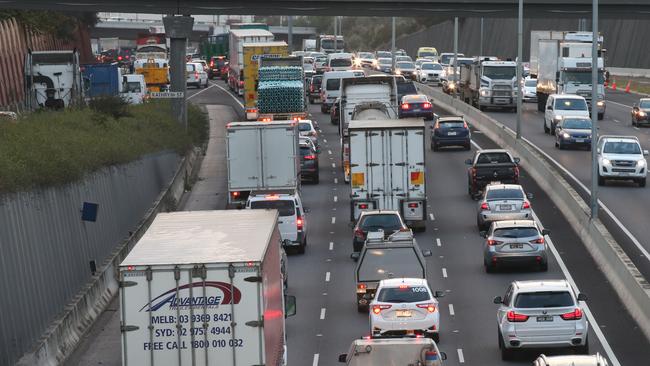
The best performing market was Sydney, where average daily travel levels lifted 21.8 per cent – or 4.5 per cent when excluding the newly opened M8/M5 East and NorthConnex – over last year to 936,000 trips per day.
Compared to the March quarter of 2019 – well before the pandemic – traffic activity was up 15.5 per cent, or roughly equal when excluding activity on the newly opened roads.
Average workday traffic increased by 20.1 per cent over last year while average weekend and public holiday traffic increased by 28.1 per cent.
The company said activity in Sydney was boosted by a relative lack of COVID-19 restrictions.
“Strong traffic performance reflected the improved operating environment in Sydney, with the city largely free of restrictions during the period,” the company said.
In Melbourne average daily traffic activity fell due to “a period of lockdown and masks enforced indoors.”
FOLLOW live ASX updates with Trading Day
Greg Sheridan 10.00am: We'll feel Covid effects for years to come
COVID-19 keeps surprising us, as it is right now. What will be the permanent changes to our lives it will bring? The brilliant achievement of the global vaccine effort is being challenged by the virus. A South African strain looks as though it can challenge immunity. New strains attack young people more frequently so that some nations that did well just because they had a younger population are now suffering.

Similarly, until recently we never ever had even one coronavirus vaccine. Now we have several. But ours, AstraZeneca — and now Johnson & Johnson as well — has shown up a tiny blood clotting risk. People naturally are spooked by this and want the safest vaccine.
It is true, though, that there is a price to pay in our being slow with vaccines. We are accruing enormous debt to remain safe and affluent. That debt has consequences.
So the permanent effects of COVID depend a good deal on how effective vaccines are in the long run. There’s still plenty of reason to be optimistic.
Here’s one contrary straw in the wind. British Prime Minister Boris Johnson said this week that Britain’s ability to open up was not a result of its successful vaccine program but of its lockdowns. If that’s true, the implication is that lockdowns will be part of the future as well as the past.
READ the full story
Lisa Allen 9.47am: That was the real Christine Holgate, mentor says
Multi-millionaire vitamin king Marcus Blackmore, the business mentor of the former Australia Post boss Christine Holgate, said the events surrounding the exit of the high-profile executive will deliver “long term” damage to the government.
Mr Blackmore and his wife Caroline Furlong, who were among the eight guests hand-picked by Ms Holgate to attend Tuesday’s explosive Senate inquiry in Canberra on Tuesday, said the spirited defence mounted by AusPost boss “was the real Christine I know”.
Ms Holgate this week accused Prime Minister Scott Morrison of “humiliating” her and the Australia Post chairman of bullying, as she lashed out at the circumstances behind her departure as chief executive over the $20,000 gift to senior executives of four Cartier watches.
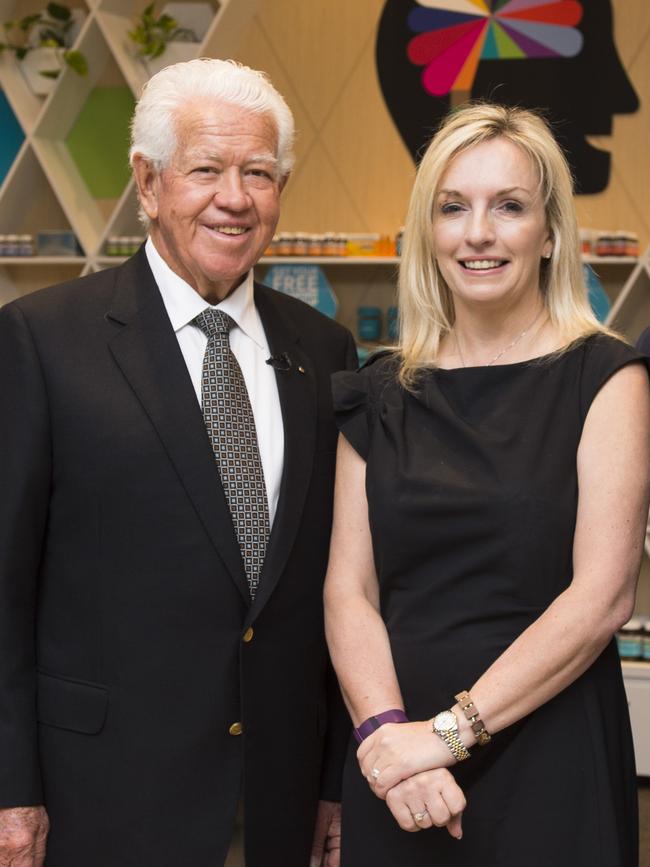
“This is going to be long-term damaging for the government … it was the Ministers and the Prime Minister who were responsible for this,” said Mr Blackmore, who employed Ms Holgate as chief executive officer at his vitamin manufacturing company that carries his name for nine years before she left to join Australia Post.
“I felt they didn’t support her …(in fact) I think they did worse than that.”
“The government totally underestimated the damage this would do to (them),” Mr Blackmore said.
READ the full story here
Adeshola Ore 9.27am: ‘Vaccinate vulnerable before opening mass clinics’
Australian Medical Association president Omar Khorshid says the government should focus on vaccinating all eligible Australians in phase 1a and 1b before establishing mass vaccination clinics.
Dr Khorshid, who will provide advice to Scott Morrison today about the nation’s vaccine rollout, said mass vaccination centres were not needed for the AstraZeneca vaccines. He said doing so would take the vaccines out of the hands of capable GPs.
“What we would really like to see is getting the job done of phase 1a and phase 1b. So that is the aged-care worker, the rest of the aged-care residents and those living with diseases. We have to get that job done as quickly as we can and then roll out perhaps a slightly modified program to the rest of the country,” he told Channel 9.
Dr Khorshid said there was “certainly merit” in the argument that states were better equipped at administering vaccines over the Commonwealth.
“General practice is this huge network of experienced vaccination centres. We have nothing like it in the country and it is the best way to get to the most people quickly, but certainly there is a place for state-run vaccination hubs as well.”
Meanwhile, Royal Australian College of General Practitioners president Karen Price has said GPs across the country are desperately trying to rebuild confidence in the inoculation program after a potential link between blood-clotting and the AstraZeneca vaccine has created “a lot of angst in the community”.
“Everyone seems to be talking about either GPs or mass vaccination, but I think it’s going to be a combination of both,” Dr Price told the ABC this morning.
“There are still a lot of people understandably wanting to talk to their GP, wanting to go to a place they trust, and we know in some ways GPs themselves are a mass vaccination centre.”
by having other mass vaccination clinics, particularly with the Pfizer vaccine, which might need some separate storage issues, that’s going to help. I think the process here is to get as many people vaccinated as possible.
Dr Price said the “GPs I’ve heard from are tired, they want some degree of certainty in the middle of an international pandemic … everyone’s having to adapt.”
Dr Price said there was a lot of angst in the community about, emphasising that GPs “need more time with patients to go through some of this (vaccine information).” — With Nicholas Jensen
READ MORE: No need for mass jab sites, say doctors
Nicholas Jensen 9.24am: Victoria records zero local virus cases
Victoria has recorded no local cases of COVID-19 in the last 24 hours, with five new cases detected in hotel quarantine.
Victorian health officials received 17,040 test results yesterday and are currently monitoring eight active cases.
Reported yesterday: no new local cases, 5 acquired overseas .
— VicGovDH (@VicGovDH) April 14, 2021
- 3,565 vaccine doses were administered
- 17,040 test results were received
Got symptoms? Get tested.
More later: https://t.co/2vKbgKHFvv#COVID19Vic#COVID19VicDatapic.twitter.com/S9FPd5Q9dx
Yesterday health officials administered 3565 vaccine doses, bringing the state’s total to 155,928 inoculations.
Adeshola Ore 9.09am:Community programs reduce incarcerations: Dodson
Labor senator Pat Dodson says community-led approaches are needed to reduce Indigenous incarceration rates which have doubled since the royal commission Aboriginal deaths in custody report was handed down thirty years ago.

To coincide with the 30 year anniversary of the royal commission, Labor has pledged to invest $79 million for justice reinvestment to reduce the disproportionately high rates of Indigenous incarceration. Under a Labor government, the party would also commit $13.5 million to make coronial inquests more effective.
Senator Dodson pointed to an Indigenous community-led justice reinvestment program trialled in the NSW town of Bourke last year which resulted in significant reductions in domestic violence and reoffending. It also was assessed at saving the NSW economy about $3.1 million.
“That program reduced recidivism. stopped serious crime. It’s had a tremendous impact. It hasn’t solved all the problems, but the focus is to keep people out of custody and the revolving door,” he told the ABC.
READ MORE: Push to lift age bar on crime
Lachlan Moffet Gray 8.48am: Recovery near complete: airlines boost capacity
Qantas has taken an $11bn hit to revenue due to the COVID-19 pandemic but is now close to a complete recovery in its domestic flights business, telling the ASX that group domestic capacity will reach 90 per cent of pre-pandemic levels by quarter four of the year.
The announcement comes as Virgin Australia said it would hire 150 more cabin crew, lease 10 more aircraft and add another 220 return flights a week as the airline strives to compete with Qantas and Rex.
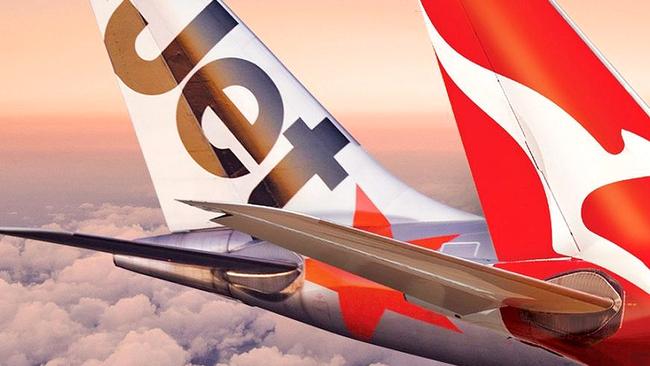
Budget airline brand Jetstar is projected to exceed 100 per cent of pre-pandemic capacity “due to strong leisure demand” boosted by the government’s half-price airline fare scheme — which helped sell 250,000 fares in two weeks — while all domestic crew for the group are now back at work.
Corporate travel is back to around 65 per cent of pre-COVID levels.
So strong is the demand for domestic travel that Jetstar will deploy up to five of its Boeing 787-8 aircraft, usually flown on international routes, in the domestic market from mid-year until international flying return.
Additionally, Qantas has engaged Alliance Airlines to operate three Embraer E190 aircraft from May to provide capacity on existing Qantas routes in northern and central Australia.
But the recovery has not been entirely smooth: Qantas said the impact of localised lockdowns over Christmas and New Year impacted FY21 EBITDA by $400m, while the snap Brisbane lockdown over Easter cost the company $29m.
CEO Alan Joyce said the group’s strategy going forward would put “short term focus on cash positive flying over profit margins” and warned shareholders of a second financial loss.
“We’ve lost more than $11 billion in revenue since the pandemic started and that number will keep growing until international travel recovers,” he said.
Qantas expects to relaunch regular international flights in October.
The strong outlook in the domestic airline sector comes as the nation’s burst of economic buoyancy is continues with consumer confidence hitting a 12-year high, shares trading at pre-pandemic levels and job advertisements at their best levels in two decades.
READ MORE: Slow jabs will delay travel, Qantas says
Adeshola Ore 8.40am: ‘Not a good move’: Navy dance display questioned
Independent Senator Jacqui Lambie says a performance of ‘twerking’ dancers during the commissioning of a HMAS Supply vessel raises concerns about the leaders of Australia’s defence force.
The Sydney launch of the new naval ship over the weekend featured scantily-clad female dancers at an event attended by Defence Force chief Angus Campbell and senior navy officials.
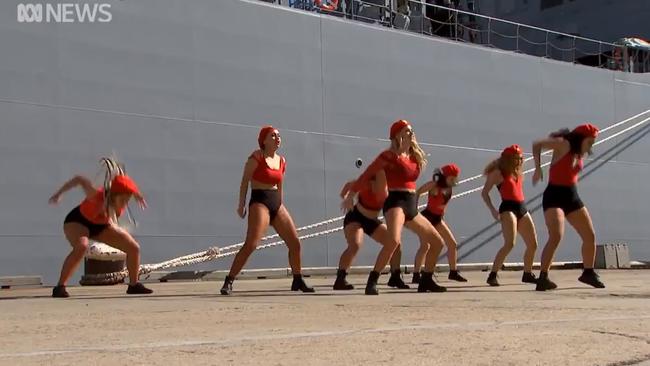
“Good on them for building their self confidence up but it probably belongs, you know, at a Super Bowl or something – not standing in front of a naval ship,” Senator Lambie told Sky News.
“We’ve still got pretty much massive issues going on in defence forces when it when it comes to abuse and sexual abuse. So having this was not a very good move and whoever was responsible needs to be held responsible for their actions.”
“We have our own children serving and we’ve got leaders that are making decisions like that, to put those dance troops out in front of our warships. It really makes me concerned — are they the same people who are going to lead our kids into war?”
READ MORE: Strewth — Dancing dangers at naval commissioning
Robyn Ironside 8.30am: Virgin ramps up flights, jobs in comeback
Virgin Australia will hire 150 more cabin crew, lease 10 more aircraft and add another 220 return flights a week as the airline strives to compete with Qantas and Rex.

CEO Jayne Hrdlicka announced the major ramp-up at a cabin crew training school in Brisbane on Thursday.
In addition to the new recruits, 220 cabin crew would return to service from the discontinued long-haul international arm, the defunct Tigerair, and ATR regional business.
Ms Hrdlicka said the carrier was strongly focused on its domestic recovery program as it built a “strong and disciplined business”.
She said the ten additional Boeing 737s would mean more flying and more jobs.
“Today we are operating around 850 weekly return flights and as we approach the June school holidays we will add another 220 return flights a week to our schedule,” Ms Hrdlicka said.
“By mid-June we expect to be at 80 per cent of our pre-COVID domestic capacity and ready for the resumption of international travel.”
READ the full story here
Adeshola Ore 8.23am: Apologise to Holgate, says ‘shocked’ independent MP
Independent MP for Indi Helen Haines has urged Scott Morrison to apologise to former Australia Post boss Christine Holgate.

Ms Holgate has demanded an apology from the Prime Minister, declaring he bullied and humiliated her on the floor of parliament when he called for her to stand aside after the purchasing of the four watches as executive bonuses were revealed last October. But Mr Morrison has refused to apologise to Ms Holgate, saying it was never his intention to offend her in the wake of the Cartier watches scandal.
Ms Haines said she was shocked by Mr Morrison’s comments when he said Ms Holgate should “go” if she would not voluntarily step aside last October.
“Show the leadership and humility of a strong leader and say sorry to Christine Holgate,” Ms Hanines told ABC Radio.
READ MORE: Niki Savva — Return to gender – AusPost saga a trip-wire for PM
Nicholas Jensen 8.16am: No point in mass vaccination without doses: Lambie
Independent senator Jacqui Lambie has criticised the government’s proposal of mass vaccination sites as a way of accelerating the country’s inoculation program, saying “you’ve actually got to have the vaccines before you can have the mass sites”.
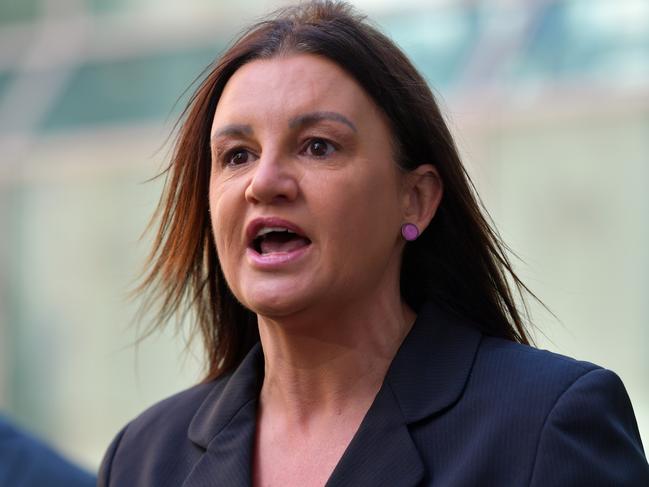
“I think we’re all having a bit of a giggle this morning going: ‘there’s no point having thoughts on sites when you don’t have anything to inject into anyone’,” Senator Lambie told Sky News.
Ms Lambie said it was crucial that the government “cements a firm date” about when we can expect the supply of vaccines, so people don’t “pin their hopes and plans on something that might not happen until after Christmas”.
“What I would hate to see is that we get all those sites organised and we still haven’t got the vaccines organised,” she said.
Senator Lambie also attacked the government’s management of the rollout, saying they “got too cocky” and failed to secure enough vaccine contracts for the country.
“They put all their hopes and dreams in one place and they did not extend themselves out to make sure if a vaccine fell over there was something to back it up and they did not do that.”
“I’m not sure if the Prime Minister and his cabinet can organise these things,” Senator Lambie said. “What does he expect the states to do? It’s not like they can just ring every country out there and ask for vaccines.”
READ MORE: PM flags ‘mass vaccination options’
Nicholas Jensen 7.36am: Vaccine passports ‘violate principles of bioethics’
A former director of the World Health Organisation has attacked plans to introduce vaccination passports or certifications, saying they confer little assurance against contagion and violate the fundamental principles of bioethics.
“At this moment we have very little proportion of the population vaccinated,” Daniel Lopez-Acuna told ABC Radio National. “We know that people who are vaccinated can still be infected or can be contagious, vaccination only prevents the severity of the disease.”
Dr Lopez-Acuna said the concept of a vaccination passport was “not scientifically meaningful” and fundamentally “unsound”, emphasising that its introduction would lead to bioethical issues.

“We should not use any document of this nature for purposes that may introduce discriminatory practices in the population,” he said.
“It is one thing to have an international certificate with pagination that states you have been vaccinated, but it’s another thing to introduce a document that is going to be used as a document for ageing people on whether or not they can access certain places,’’ Dr Lopez-Acuna said.
“I think the most important element is to try and avoid the sense of security that some people think can exist with a COVID passport.”
READ MORE: Ramadan meetings axed as third wave strikes
Jess Malcolm 7.29am:Szubanski defends PM wife tweet
Magda Szubanski has defended her tweets about Jenny Morrison, saying she was not attacking the appearance of the Prime Minister’s wife, and she did not know it was her.
In an interview with A Current Affair on Wednesday night, Szubanski addressed controversy in recent days after she retweeted a photo of Scott Morrison signing condolences to the royals following the death of Prince Phillip as his wife stood beside him.
Szubanski was criticised for her tweet, which said: “I genuinely thought this was a photoshopped Handmaid’s Tale meme. But no, it’s 21st-century Aussie life.”
I genuinely thought this was a photoshopped Handmaid’s Tale meme. But no. It’s 21st century Aussie life. https://t.co/S5NckoHv1q
— Magda Szubanski AO (@MagdaSzubanski) April 11, 2021
The comedian said she was not criticising Ms Morrison.
“I just thought it was a strange PR or photograph, and all I’m suggesting with that comment is Scott Morrison is the master of spin,” she told A Current Affair.
READ the full story here
Rachel Baxendale 7.22am: Minister slaps down Holgate over AusPost exit
Communications Minister Paul Fletcher has rejected suggestions Christine Holgate was forced out of Australia Post because she opposed recommendations in a Boston Consulting Group review that she sell off the parcels business.
Mr Fletcher’s first public comments since Ms Holgate used a Senate hearing on Tuesday to accuse Scott Morrison of bullying her out of her role as CEO came as The Australian learned she had given the Senate committee conducting the inquiry an assurance she would not commence legal action until its report was concluded.
Ms Holgate refused to rule out suing Australia Post and “others” during an interview on the ABC’s 7.30 on Tuesday, but sources close to her but not authorised to speak publicly said on Wednesday she had assured the committee she would put the legal threat on hold.
Mr Fletcher said Ms Holgate had resigned and provided an assurance the government had no intention of splitting up Australia Post or selling off the parcels business, despite Ms Holgate’s suggestion to the contrary.
He said it was Labor that tried to launch a “political hit job” against Ms Holgate in the first place. “Australia Post is a government business enterprise, 100 per cent owned by the government.
READ the full story here
Nicholas Jensen 6.55am: Queensland eases COVID-19 restrictions from today
Queensland’s COVID-19 restrictions have eased this morning after recording no new cases of community transmission.
At a press conference yesterday, Premier Annastacia Palaszczuk announced the restrictions would be relaxed from Thursday 6am.
It comes more than two weeks after the state was placed in a snap three-day lockdown to stop the spread of COVID-19 after two clusters emerged from Brisbane’s Princess Alexandra Hospital.
Across the state masks will no longer be mandatory, dancing will return, and visits will be permitted to aged care and disability homes, hospitals and prisons.
From 6am tomorrow:
— Queensland Health (@qldhealthnews) April 14, 2021
😷 Face masks are no longer mandatory except in airports and on planes.
ðŸ 100 people can gather at your home
🌳 There are no limits on the number of people that can gather in public spaces pic.twitter.com/pJmk1ul3H0
What has changed as of 6am today:
■ Standing will be allowed at pubs and clubs while eating and drinking;
■ Visitors at private residences will increase to 100;
■ Visitors will be permitted at aged care and disability care homes, hospitals and correctional facilities;
■ Dancing at nightclubs and indoor venues will be permitted;
■ Weddings and funerals will be allowed to host 200 guests;
■ Outdoors there will be no restrictions on gatherings; and
■ Ticketed venues and open-air stadiums will be able to return to 100 per cent capacity
■ Masks will no longer be mandatory indoors except at airports, but Queenslanders will be encouraged to carry one and wear it on public transport or where social distancing is not possible.
READ MORE: Rescue plan for failed Queensland biotech
Nicholas Jensen 6.45am: Spain confident of reaching 70pc vaccination target
Spain insists it can maintain its inoculation targets despite the US suspension of the Johnson & Johnson vaccine and further delays related to clotting concerns in Europe.
Spain is preparing to receive five million more doses of the Pfizer vaccine than expected before the end of June.
Earlier this week, Spain’s health minister Carolina Darias confirmed the arrival of an initial delivery of 146,000 J&J doses, which will be kept in storage pending guidance from the European Medicines Agency.
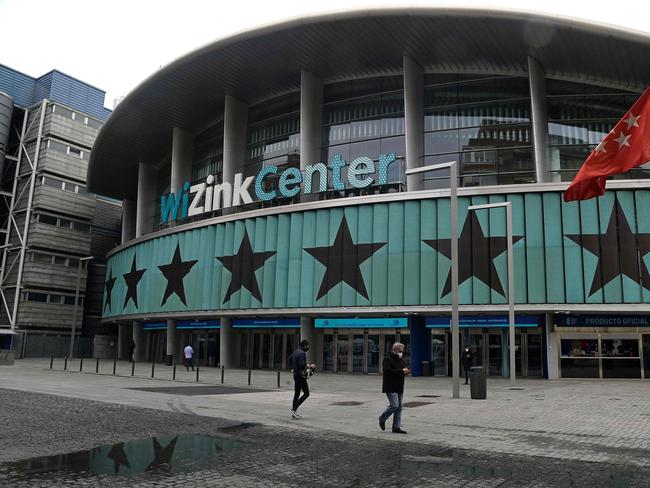
Ms Darias said she is confident that 70 per cent of Spain’s population will be vaccinated by the end of the summer.
Spain’s health ministry plans to have half its population of 47 million fully inoculated by the end of July, with close to 7 per cent vaccinated to date.
Accelerating the country’s vaccination campaign has become urgent as Spain’s national infection rate continues to climb.
For the last two weeks, infections exceeded 200 cases per 100,000 people, with the health ministry reporting 10,474 new cases.
READ MORE: Reason for stark drop in Australian vaccinations
Nicholas Jensen 6.30am: Mutations make may virus ‘more resistant to vaccines’
Brazil’s COVID-19 variant is mutating in ways that could make it easier to evade antibodies, according to scientists investigating the virus.
The research conducted by the country’s public health institute found that those mutations could make the virus more resistant to vaccines, with dangerous implications for the current surge in cases.

“We believe it’s another escape mechanism the virus is creating to evade the response of antibodies,” said Felipe Naveca, a co-author of the study.
Dr Naveca said the changes appeared to be similar to the mutations detected in the more aggressive South African variant, where studies have shown some vaccines have substantially reduced efficacy.
“This is particularly worrying because the virus is continuing to accelerate in its evolution,” he said.
The research indicates that the Brazilian variant could be more than twice as contagious than the original COVID-19 and more resistant to antibodies.
On Tuesday, France suspended all flights to and from Brazil in a bid to prevent the variant’s spread.
The variant is believed to be one of the main forces behind the country’s massive second wave, which has inflicted a death toll of more than 350,000 people.
Brazil’s current surge is also affecting younger people, with national hospital data showing more than half of all patients in intensive care units are aged 40 or younger.
READ MORE: Jack the Insider — The crucial war against anti-vaxxers
Nicholas Jensen 6.15am: Denmark first nation to drop AstraZeneca vaccine
Denmark has become the first country to stop administering the AstraZeneca vaccine for its entire population over concerns the shot is linked to a rare but serious form of blood clot.
The decision will delay the conclusion of Denmark’s vaccination scheme to early August, health authorities said, with the revised timeline assuming the use of the Johnson & Johnson vaccine.
Denmark’s chief health agency said investigations into AstraZeneca “showed real and serious side-effects”.
“We have therefore chosen to continue the vaccination program for all target groups without this vaccine,” agency head Soren Brostrom said.
While AstraZeneca said it respected Denmark’s decision, the company added that it would continue to provide data to inform government responses to their vaccine.
“Implementation and rollout of the vaccine program is a matter for each country to decide, based on local conditions”, the company said in a statement.
Many European countries have now resumed using the vaccine, with some restricting it to certain age groups, mostly those aged above 50 or 60.
Dr Brostrom said joint studies based on Danish and Norwegian health data estimated that one in 40,000 people vaccinated with the AstraZeneca jab could experience serious complications.
“This must be weighed against the fact that we now have a known risk of serious harmful effects … with the COVID-19 vaccine from AstraZeneca, even though the risk in absolute numbers is small.”
“I understand very well why other countries will use it,” Dr Brostrom said.
READ MORE: Greg Sheridan — COVID-19 effects will last for years, despite vaccines
Patrick Commins 5.10am: Cashed-up and confident: COVID-19 rebound is here
Australia’s burst of economic buoyancy is continuing with consumer confidence hitting a 12-year high, shares trading at pre-pandemic levels and job advertisements at their best levels in two decades.
Less than four weeks from the federal budget being handed down, unemployment figures to be released on Thursday are expected to fall again, confirming the strong post-pandemic rebound and increasing confidence that the end of JobKeeper payments last month will not cause an economic setback.

The benchmark ASX 200 index closed above 7000 points for the first time since the pandemic began after the release of the strong consumer confidence indicators.
Economists are optimistic that Thursday’s labour force figures will show strong jobs growth, with the Commonwealth Bank forecasting unemployment would fall to 5.7 per cent for March.
Belinda Allen, a CBA economist, said cashed-up consumers were now “in a sweet spot”.
With consumer optimism flying high and businesses reporting the best operating conditions on record, economists have been caught out by the pace of the post-pandemic recovery.
Read the full story, by Patrick Commins and David Tanner, here.
Olivia Caisley 5am: New survey shows women have abandoned Coalition
Australian women’s perception of federal leaders took a steep dive from the end of 2020 to the first quarter of 2021 amid a slew of Parliament House scandals, including the alleged rape of former Liberal staffer Brittany Higgins and revelations that male escorts had been brought into parliament for MPs.
New research from Swinburne University shows Australian women’s support for the government dropped from 44 per cent in the final quarter of 2020 to 29 per cent in the first quarter of 2021.
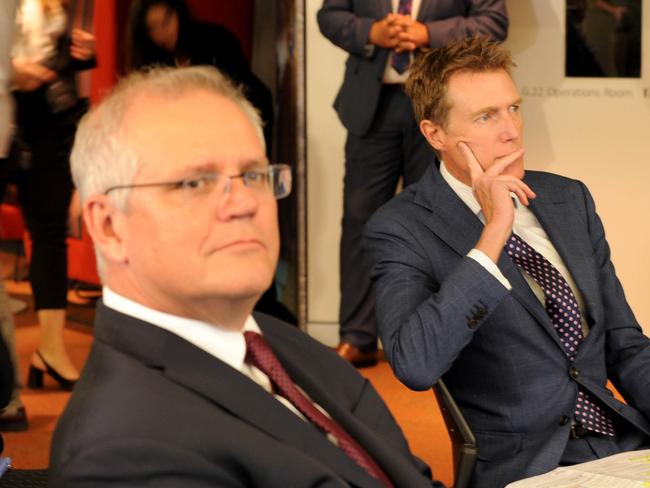
In contrast, men’s ratings remained stable at 47 per cent.
The Australian Leadership Index (ALI) shows receding levels of public trust for the federal government and found the “demonstration of high ethical standards” as being central to women’s perceptions of government leadership.
Researcher Melissa Wheeler said the data provided irrefutable evidence of the receding levels of public trust in the federal government, especially by female constituents, amid a war of words with the premiers over the vaccine rollout and the aftermath of the sexual assault allegations that have rocked the Morrison government.
Read the full story here.
Richard Ferguson 4.45am: Aussies fear risk from emerging PNG Covid variants
More than three-quarters of Australians say they are concerned about new COVID-19 variants from Papua New Guinea and back moves to send one million AstraZeneca vaccine doses there.
According to polling conducted by YouGov, 82 per cent of respondents say they support the notion emerging coronavirus variants from PNG pose a risk to Australia, and eight out of 10 agree with Scott Morrison that there is a risk in accepting travellers from the island nation.
The Prime Minister has moved recently to divert some of Australia’s AstraZeneca stock to PNG to quell a COVID-19 surge that has decimated its hospital system.
The YouGov polling, commissioned by the Australian Council for International Development, said 76 per cent of respondents in Australia believed Mr Morrison should donate one million of Australia’s 50 million domestically produced AstraZeneca vaccines to PNG.
Read the full story here.





To join the conversation, please log in. Don't have an account? Register
Join the conversation, you are commenting as Logout